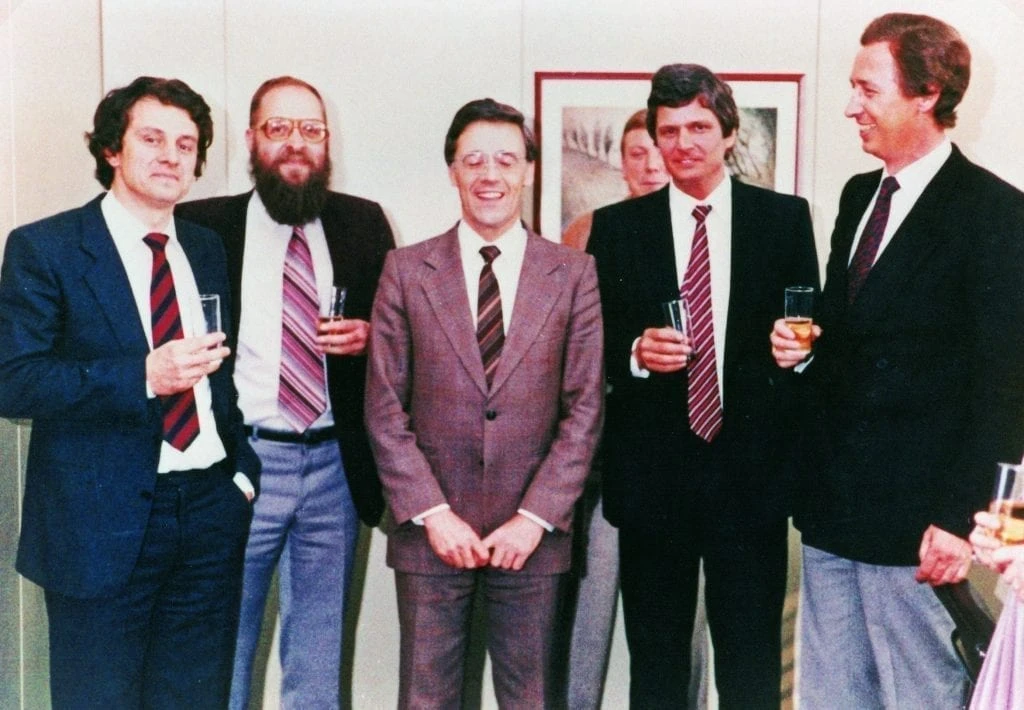The Lives and Careers of 6 SAP Professionals...
The Lives and Careers of 6 SAP Professionals...
What are the best SAP projects ever to date?
What can we expect for the future of SAP? Will it even be around in 10 years after S/4HANA?
What tips can experienced SAP consultants offer to those just getting started in our niche IT sector?
These, and other questions, will be considered by a panel of 6 SAP professionals in the Eursap blog post below.
SAP has provided great careers in IT for several decades now, which is fairly common knowledge. There are many well paid consultants on every continent, eliminating spreadsheet driven processes, configuring interfaces, and delivering solutions. To some extent, these are recession proof jobs – all because 5 guys from IBM in Mannheim, Germany set out to create their own accounting program in 1972.

Today, this is a giant eco-system responsible for the employment of tens of thousands of consultants, many of them relatively new to the SAP space. This article will serve as a dialogue about how to get started, how to thrive, and how to survive in the challenging world of SAP Consultancy.
Accordingly, this is neither a deep dive into technical aspects nor does it provide pro tips for SAP customisation. Rather, this is an SAP people and career article, where you can compare your own experiences as an SAP professional with the stories and anecdotes below.
Our six SAP panellists
In no particular order, our first panellist hails from The Netherlands, Mr. Eltjo Timmerman. He is an SAP PP / MM / QM Consultant and Project Manager.

Secondly, we have Mr. V, born in Italy. He is an SAP FI and CO consultant. He is not the biggest fan of online publicity or social media, so has chosen to remain an International Man of Mystery.

Thirdly, Mr. Peter Rego currently based in Belgium where he plies his craft as an SAP PM consultant.

Next, our fourth consultant, is Mr. Rishab Bucha from London providing services as an SAP Solution Architect in Finance and Procurement.

Fifthly, I present to you Ms. Isabel Sanchez from Spain, an SAP CO / MM / SD / FI Trainer.

Mixing the dialogue and trying to settle scores for you is your humble moderator, James Olcott, an SAP SD / MM / BOBJ consultant (and writer!) hailing from across the pond in New York City.

Let’s get right into this. Questions below are in blue bold; respondents’ answers are tagged by first name.
1. How did you first get into SAP??

Eltjo: I was interviewing for a job in Big 5 Consulting expecting to make presentations for a living, when the interviewer asked me what I wanted to do for them and I replied “whatever it is you need most”? Before I could say "implementation?guide"?I was at London Heathrow for an SAP PP course.
Mr V: I was an accountant and asked to to be the key user for FI in the client's SAP Implementation. I then supported old style general ledger systems in a consultancy and I eventually started implementing SAP after attending the SAP FI Academy.
Peter: Completely by accident? I went to work at a former 'big 5' consultancy and on the first day, we were split into groups.? Some went to do other ERPs and I was placed in the SAP Team.
Rishab: I started out as a technical consultant (ABAPer) when I joined Accenture and got a chance to train and work on SAP ABAP related developments.
Isabel: I started in the year 2015, when I took a course. Having used other ERPs, I thought that SAP could give me wings to find a more suitable job, so I enrolled in an SAP FI course.
James: When I took my SAP certification course in 1998, I was struck bythe profound depth of the tree and branch menu items and how they matched business precepts that I studied in Business School. I finished first in my class and was immediately placed into my first project with a Japanese company which lasted 5 years!
2. What has been your most rewarding moment as an SAP consultant?
Eltjo: Showing up for Go Live Monday one time where the key user said to me, “go home, you explained what we need to do, we got this.”??And they did not ask a single further question. Project over and completed successfully! I've also had the good fortune to work on several International SAP assignments via Eursap, which were all good experiences.
Mr V: All the thank yous from clients are very nice.
Peter: Having a key user and business sponsor telling me that, what was designed in the project and the outcome of the go live, had improved efficiency and planning of resources and spare parts in a way that had never been achieved before in the organisation.
Rishab: I have more than 10 years' SAP experience and it has been a very rewarding and fulfilling journey so far. There have been various points but my top 3 are:
- Helping lead and design the key solution for clients and taking them to go-live. I have had chance to work for a range of customers from a big bank to a poultry farm; each client was a learning experience.
- Being selected as topic leader for S/4HANA Finance (2015-16).
- Being one of the youngest presenters at SAP Teched.
The journey has been great so far and I have had many rewarding moments.
Isabel: My most rewarding moments have been when I passed the SAP CO certification exam. Also working in my current job, when my first virtual course was launched (with good comments from the pupils).
James: While training Customer Service reps at Bristol Myers Squibb, we came to focus on free goods scenarios where we were to provide free medicine to sick people who needed it. Everyone really seemed to latch onto the importance of what their order intake process was really all about. Yes, they were inputting orders into a computer system – but they came to see themselves as Florence Nightingales delivering cures, mercy, and compassion. I received many mentions of this on my roll-off card and it still touches me to this day.
3. What is the funniest/strangest thing you have experienced in your career as an SAP Consultant?

Eltjo: In Spain, going live with two iPhones providing network connection for the whole company... and then leaving my charger in the hotel!?? Or in China, the request for a GL account to post bribes to? Or in India, the shrine that was put up to have a priest bless the first SAP invoice.?? Or that one time in Oklahoma with the tornado warning where we sat in the bunker wearing our 5-gallon hats trying to blend in.
Mr V: The young project manager in Mexico City who used to down half a bottle of Dimple Haig at lunchtime along with his two henchmen.
Peter: Having a go-live stopped by the police as the building was placed in lock down? We had not slept for 3 days getting everything ready for the first transactions to start and then the police descended on the building and shut us down? Those who were there remember it well.
Rishab: I moved from Accenture to SAP Labs where I was supporting product development (SAP-MRS) and I got a chance to work on multiple engagements. One of our clients (a big French fashion house) would have a daily image of a model on the main SAP menu (once you logged on). This was interesting and I think it encouraged consultants to log on to their system each and every day, at least to check out the visuals.
Isabel: The fact that I've sometimes had to explain such basic things, in some instances users have even struggled to switch on their computers!
James: I had a training project last year where the customer was completely unable to provide SAP system access to me. Wrap your heads around the challenge of working on a project without SAP access – if you can!
4. What is the number one piece of advice you would give to someone just starting their career as an SAP Consultant??
Eltjo: Start by learning a part of the business processes that the system can support really well, and then understand how it fits in the whole picture? The same goes for your part in the SAP implementation; understand the project plan, and why decisions are made to adjust the plan?
Mr V: Stay in applications but try to find another product that is likely to have strong growth over the next 20 years? SAP is always good, but it is a mature product and consultant competition has increased.
Peter: Be Humble and always willing to learn new things!??
Rishab: Someone told me early in my career that the acronym of SAP is Sit and Practice. This is very much true and there are a lot of new and exciting things which are happening in the SAP world… but there is no shortcut! So you should find your core area, whether it be Finance, Project Management, Development etc. Spend time honing that area. Learn and be aware of how your area links to other aspects. Keep on learning and always try to find how your work fits into the big picture.
Isabel: Patience, keep on studying and gaining experience.
James: Someone mentioned to me early on that learning the data tables and how to write queries therein would be a good specialty. He was right! Like Rishab mentioned above, the P in SAP is practice! While in between projects, I rent space on a generic SAP box out of India and recreate my configurations! I have also come across some useful Blog posts for those just starting their SAP careers, here on the Eursap Blog, you might want to check out: How to write the perfect SAP CV, How to jump-start your SAP career and 5 ways to improve your chances of securing an SAP Job.
5. Why do you like SAP?
Eltjo: It’s given me a tremendously varied career – the job has taken me to 35 or so countries for at least that many clients, working with almost every department of a large variety of companies. And meeting lots of interesting people?
Mr V: It is a nice mental challenge given the complexity? I like working with users.
Peter: Because it is a product that is ‘mouldable’ to an organisation yet rigid.? The structure and discipline that SAP requires for an organization ensure that business processes are followed as well as allowing for new functionalities to be deployed based on what is already there.? Also, the fact that SAP is present in so many organisations worldwide now, we all now use much of the same terminology and vocabulary.
Rishab: I like SAP as a solution because of its:
a) Robust setup – a lot of processes around finance, procurement etc. are already built-in for most businesses. This is a huge advantage for any client in any industry.
b) Years of development and support infrastructure. SAP has been around for a long time and there is a huge amount of SAP support in term of blogs and forums which are really useful.
c) Focus on innovation – SAP is working on all the key buzz words like RPA, AI, ML, Blockchain and all these are available as SaaS so you can also plug and play these key features and use them as per your needs.
Isabel: Because, compared to other ERPs, it is the most difficult yet complete ERP.
James: As Peter said above, the standardisation introduced by SAP to worldwide business is truly a remarkable thing. Need I add the word “efficiency?”
6. What do you think SAP will look like in 10 years’ time?

Eltjo: I think SAP is moving to becoming an on-line preconfigured backbone with interfaces to specialist packages that we used to have those massive custom developments for. So, coming back to question 4: learn part of the system well, and then learn how other packages can improve it?
Mr V: SAP will still probably be the largest ERP as it is strongly entrenched, but you never know? Every product has a life cycle? IBM was once almost a virtual monopoly and the laws of economics say monopolies do not last forever.
Peter: I believe that there will be many new suites of products that will arrive that will build on top of the new S/4HANA platform? I believe that SAP will be increasing the functionality, and everything will be at least in Fiori by then.
Rishab: That is very interesting, and 10 years is a really long time. I would rather pivot my answer to a slightly shorter timescale: you will have a wave of migrations / implementations of S/4HANA for next 4-6 years or fixing the core processes. Then there will be focus on additional values from the digital platform (AI, RPA etc.).
Isabel: The traditional on-premise deployments will be history.
James: Mr V – your answer that SAP may go the way of the Roman Empire is somewhat startling, yet historically accurate. For example, there was no more solid, grander, or safer company in the 1930s than the New York Central Railroad. However, they started losing revenue after World War II, omitted dividends in 1958, and then the chairman died by his own hand later that very month. Do you really see evidence of such kind of decline?
Mr V: James, it’s just a basic law of economics - monopolies do not last - see IBM as I mentioned previously. SAP is effectively a monopoly in large software systems? They could go like Coca Cola and hang on, but technological change respects no one.
James: I hear you. History is littered with the debris of broken giants. My point is, we just don’t see evidence, at least not yet, of this for SAP. Yes, it is now a mature product, but the market share is still strong, and S/4HANA is aimed squarely at Oracle. I don’t see why SAP should not be able to make it – as I have written on my linkedin.com page – I look forward to the next SAP version after S/4HANA, which I have nicknamed, somewhat tongue-in-cheek, as “T5MONA”. Like Eltjo said, I think SAP will continue to include everything on a pre-configured basis. Maybe even Master Data!
Mr V: By the way, “MONA” in Italian is fool, or in my dialect, certain anatomical parts.
James: My point exactly! Gracie!
7. If you hadn't become an SAP Consultant, what job do think you’d be doing now instead?
Eltjo: Probably something a little less heroic, so I’ll go with astronaut? Or fireman? Or teacher.
Mr V: Running a beachfront bar on a little island in the Caribbean? Just kidding? Perhaps still in management consulting or some senior IT job.
Peter: I have no idea!? I started my professional life doing SAP (apart from jobs at Uni)? It has been my career path for the last 20 years.
Rishab: I would have done something in software development, probably embedded system designer.
Isabel: I would have continued in Finance Departments, bored.
James: Eltjo, I probably would’ve been feeding lions in the local zoo. Same skill set as a typical day on a nasty project.
8. What was the best team you’ve ever worked with and why?
Eltjo: The teams where people said “I don’t know” without expecting others to instantly make it their problem.
Mr V: Big Pharma clients often have very professional teams in place in my experience?
Peter: I have worked with so many good teams, they are all different and all brilliant for different reasons? Some projects stand out more than others for camaraderie, innovation, and work delivery.
Rishab: I have had the chance to work with some of the best people and from multiple countries. I would not like to categorize any as the best because human memory recall always has recent bias (my opinion). I will mention that my recent project with Royal Bank of Canada – Investor and Treasury services for their S/4HANA 1709 implementation where I was SAP lead. We followed the Agile approach for the project (one of the few successful ones), went live in 7 countries in a period of 20 months, had great user feedback, and were able to upgrade S/4HANA systems in 3 weeks. The team was absolutely fabulous and had the right “Can Do” attitude which counts for so much in terms of transformative technologies.
Isabel: My current project right now at the Grupo Euroformac which is blessed with very good professionals, and I am learning a lot.
James: Like you Rishab, I favour projects in more recent memory. My Pfizer project just completed had, in my opinion, a legendary team that held together as a magical unit. I was very privileged to have been a part of it. Also, my experience with the Société Assurance Automobile Québec, was very good. With a small team and tight scope, we completed in 4 months! Client extremely happy!
9. If you could change one thing about SAP, what would it be and why?
Eltjo: That hourglass does get a little boring after a while? Just saying.
Mr V: Cannot think of anything obvious? Perhaps better documentation.
Peter: Some of the rigidity!? Now with S/4 HANA, it is becoming better, but having worked for almost 20 years in R/3, sometimes solutions had to be custom built which was a shame?
Rishab: Currently I think they can be more open in terms of the business benefits and customer case studies for the latest technologies.
Isabel: The fees, it's very expensive and the fact that many people without official certification work with SAP.
James: Like you Mr V, I find the documentation to be very obtuse from time to time. Also, very annoying jargon in marketing materials. And too many things called “HANA”.
10. What are your hobbies/interests outside of work?

Eltjo: Diving, sailing, skiing, and ranting to my dog about how my day’s been. Also, my degree in Psychology seems to take more time than planned.
Mr V: Resolving SAP problems in the back of my mind? I have an IQ of over 150, my brain enjoys it.
Peter: Cars, Motorbikes and the open road!
Rishab: Outside work, I love trekking, cooking and spending time with friends and family.
Isabel: Hiking, travelling and reading. I am pretty interested in technology in general.
James: Body-surfing in the ocean, skiing, hiking, a little tennis and sport croquet. Fine wines and dining probably fit somewhere in the mix. I am known in my projects as the guy who finds the local French restaurant.
Closing Remarks
In closing, remember that there is room for joy in one’s personal life, and this shouldn’t exclude the workplace. There are both joyful SAP projects and joyless ones out there. Take it from me and the other panellists, we’ve seen both out there.
I think one thing we can distil from the above discussion is the tremendous (and at times transcendent) personal satisfaction SAP professionals derive from solving problems (puzzles, really) at the world’s leading corporations. And then leaving those companies in better places than when we found them, after which we go on to the next challenge. A new and different team / atmosphere; being their SAP televangelist, thumping the config, and making them SAP believers too. SAP can make for careers where the excitement is truly palpable.